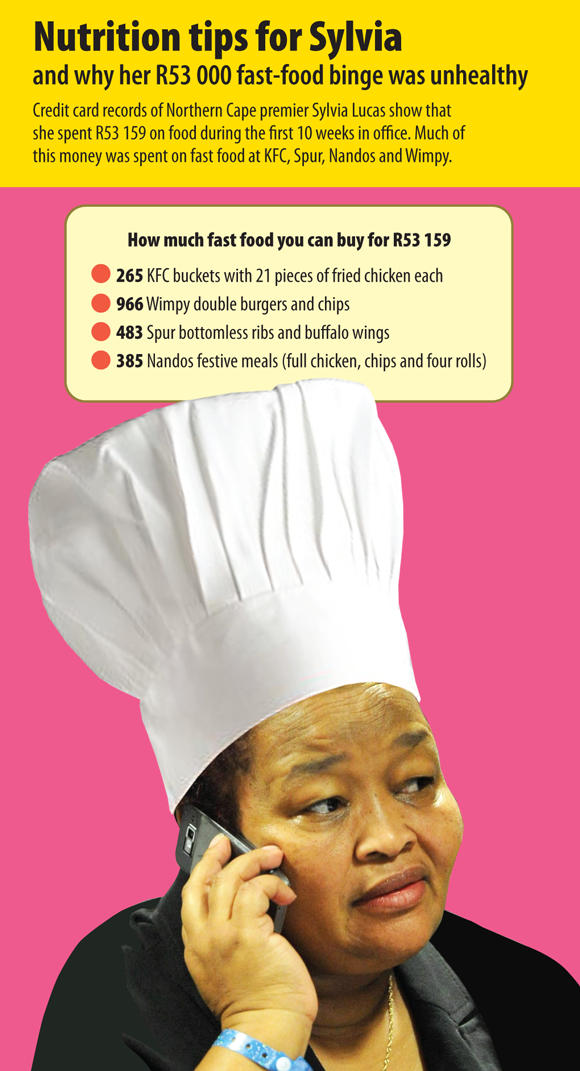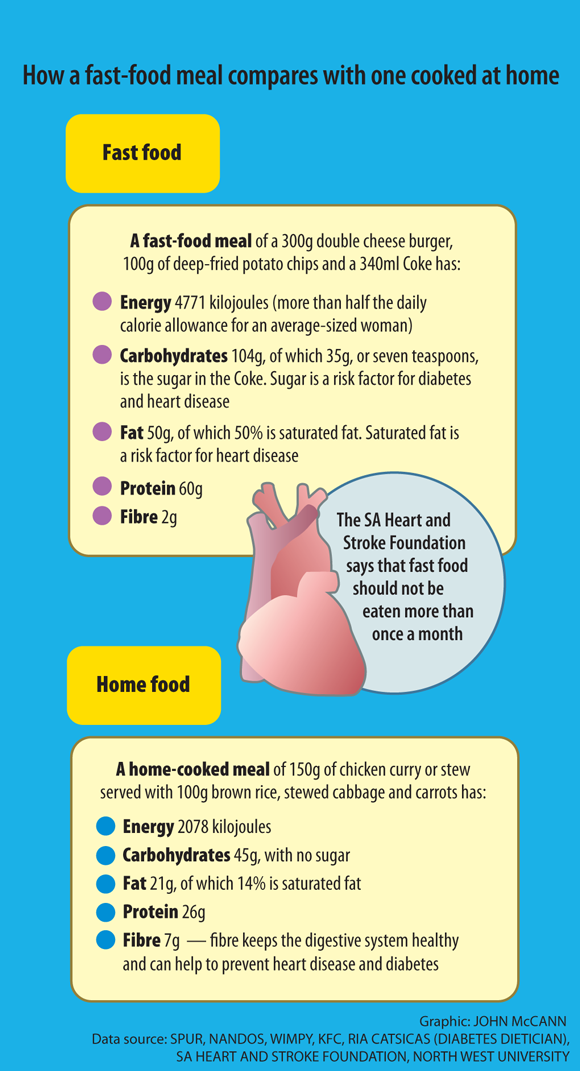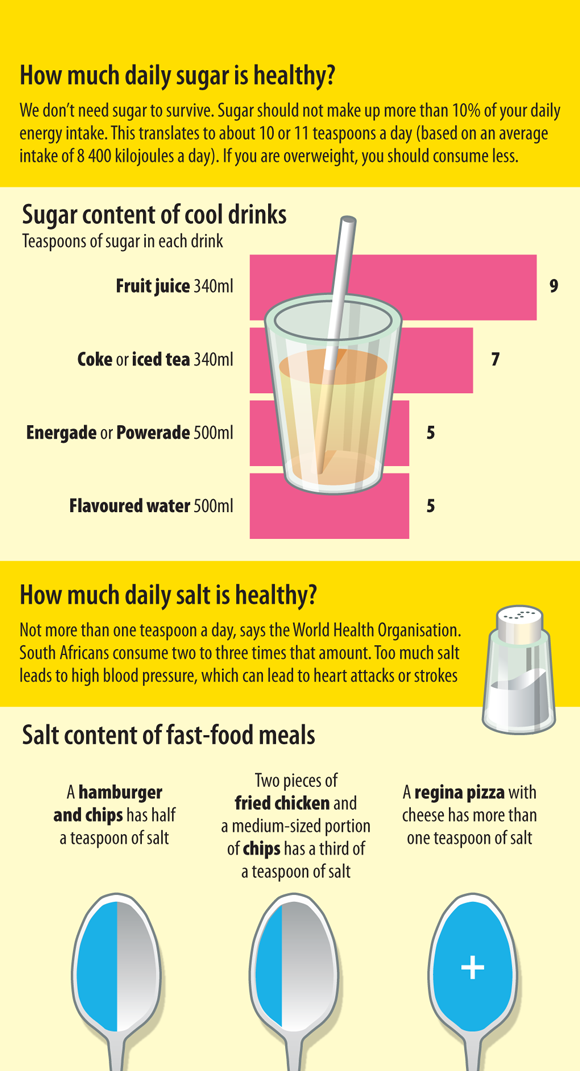Experts say the vast sum spent by Sylvia Lucas on unhealthy food is indicative of a big fat problem.
"A dangerous slap in the face of South Africa." That's how the country's Heart and Stroke Foundation reacted this week to the news that Northern Cape Premier Sylvia Lucas spent tens of thousands of rand on fast food during her first 10 weeks in office.
Health activists also described Lucas's action as an "insult" to the health department's much-lauded efforts to prevent lifestyle diseases such as diabetes, obesity and heart ailments, which are increasing at an unprecedented rate in South Africa.
Health Minister Aaron Motsoaledi has often voiced his concern that the country is facing an "epidemic" of noncommunicable illnesses.
This week, the chief executive of the Heart and Stroke Foundation, Vash Mungal-Singh, told the Mail & Guardian: "Through her irresponsible, thoughtless behaviour, Lucas has created the perception among millions of our people that it's perfectly okay to consume extreme amounts of junk food. About that I could scream and shout. Our health minister makes great policy and then his fellow government members don't practice it. How on earth then do we expect people to start living in a more healthy way when they have people like Sylvia Lucas as role models?"
Lucas's government credit card records, of which the M&G has seen copies, reveal that she spent R53 159 of taxpayers' money on food in two and a half months, with regular and large purchases at fast food outlets and restaurants such as Spur, Wimpy, Nando's and Kentucky Fried Chicken.
Health experts say excessive consumption of fast food leads to lifestyle diseases because of their high levels of fat, salt and sugar, and that eating a lot of salt results in high blood pressure, one of the major causes of heart attacks and strokes.
According to Mungal-Singh, one in three South Africans aged 15 and older has high blood pressure. The government's noncommunicable disease plan aims to reduce this by 20% by 2020.
The state has also pledged to encourage the adoption of the World Health Organisation's recommendation that people eat no more than one teaspoon of salt a day. Mungal-Singh said South Africans currently consumed two to three times more salt than what was considered healthy.
"Our health minister has been a champion at setting the example of a healthy lifestyle. But what happens when other government leaders do exactly the opposite? It breaks down what he's trying to build and results in those who look to leaders like Lucas, for example, thinking it is okay to live on fast food."
"[N]o more than once a month"
The Heart and Stroke Foundation recommends that fast food be eaten no more than once a month.
When Motsoaledi became health minister in 2009, he lost a significant amount of weight by eating healthily and following an exercise regime that he has since maintained.
He has frequently stated, even in Parliament, that it is important for politicians to have a healthy diet and to exercise to set an example for the public, but he has also voiced disappointment that his advice is being ignored in government circles.
Last year, Motsoaledi said: "I use every available opportunity in Cabinet meetings to address high salt intake and to advocate healthy diets. But the problem as a public representative is that there is [unhealthy] food everywhere."
Medical studies confirm that regular consumption of food that contains a lot of fat and sugar results in weight gain, particularly when it is not combined with exercise.
According to the Human Sciences Research Council's National Health and Nutrition Examination Survey, released in August, 70% of South African women are overweight or obese; the same applies to a quarter of the country's men. The overweight are far more likely to suffer from diabetes or high blood pressure.
The health department wants to reduce the amount of overweight people by at least 10% by 2020.
Its head of noncommunicable diseases, Melvyn Freeman, said diabetes was the lifestyle condition "increasing the fastest" in the country.
"Fast food contributes heavily to the vast number of overweight people. Burgers are fried in fat and the meat they're made of is not lean, but the fatty sides that sizzle on the fire," he said.
The fat and salt in fast food "clogs arteries, veins and heart valves, so that the circulation of the food through the blood itself also becomes a risk factor", Freeman said.
Politicians should set "an example"
He emphasised the importance of political leaders "setting an example" by supporting, and being seen to support, the health department's plan to reduce levels of noncommunicable disease. Freeman reiterated the urgency for South Africans to receive information explaining the risks associated with regular and excessive consumption of fast food.
But Mungal-Singh warned: "The health department can distribute as much information as it wants. If government leaders don't set an example, there will be no change. People learn from examples, not from pamphlets and hot air."
Another factor of extreme concern, she said, was that people who ate a lot of salty fast food also had a tendency to consume "plenty" of fizzy drinks that contain a lot of sugar to quench their thirst. Tests have shown that one soft drink contains on average seven teaspoons of sugar, about three-quarters of the entire amount of sugar that is healthy for a person to consume per day.
Lucas told the Sunday Times that she and her staff had "terribly long distances to travel" and that they therefore needed "Powerade for energy". A bottle of Powerade contains six teaspoons of sugar (see graphic).
According to Ria Catsicas, a Johannesburg dietician who consults for the South African Diabetes Association, almost a quarter of South Africans between 55 and 64 are pre-diabetic, with dangerously high blood-sugar levels.
"It seems that government leaders such as Lucas brush off the country's obesity levels and the consequences of bad eating habits. They think it's unimportant. She's definitely not the only one."
Said Catsicas: "Diabetes makes you tired, which is why people suffering from it, and those who are on their way to getting it, often find it hard to concentrate and feel sleepy during the day."
Home-cooked meals
Her recommendation is that Lucas consider eating home-cooked meals. "She'll find that bringing a portion of rice and veggies to work, a leftover from a home-cooked supper, will not only be healthier, but also cheaper."
Mungal-Singh proposed that if the premier did not have the time to cook at home, she could eat healthy takeaways such as grilled fish with salad.
"It's also important that she remember that ready-made sauces are generally high in fat and salt, so it's better just to use her own mixture of olive oil and vinegar," Mungal-Singh said.
Lucas became premier earlier this year after the previous Northern Cape leader, Hazel Jenkins, suffered a stroke.
In her inauguration speech in April, Lucas committed herself to governing with "humility and honour". She also pledged to "improve healthcare for all" in her province and to "making the Northern Cape a home where children can grow up healthy".
Said Catsicas: "If we want our children to grow up healthy, we as adults need to set an example of a healthy lifestyle. For all responsible South Africans, it's as simple as that."
Or, in the case of Sylvia Lucas, as complicated.



